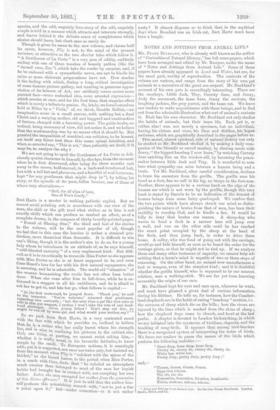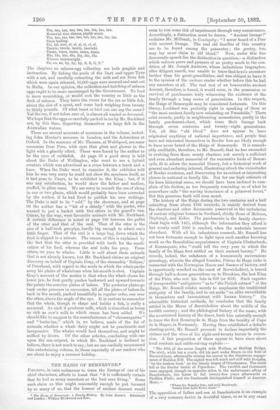NOTES AND JOTTINGS FROM ANIMAL LIFE.*
Mn. FRANK BUCKLAND, who is already well known as the author of "Curiosities of Natural History," has left some papers, which have been arranged and edited by Mr. Bompas, under the name of "Notes and Jottings from Animal Life." Some of these papers have already appeared in Land and Water, but are, for the most part, worthy of reproduction. The contents of the volume are various, and range from the story of his own pet animals to a narrative of the great sea-serpent. Mr. Buckland's account of his own pets is exceedingly interesting. There are the monkeys, Little Jack, Tiny, Carroty Jane, and Jenny, Judy the marmoset, the tame hare, Jenny the suricate, the laughing jackass, the grey parrot, and the tame rat. We leave our readers to make acquaintance with these beings, and to find out from the admirable illustration what sort of animal a suricate is. Each has his own character. Mr. Buckland not only studies the habits of animals, but their inner life. Each pet is, or rather, alas ! was, not merely a specimen, but an individual, having his virtues and vices, his likes and dislikes, his hopes
and aims, which are graphically described in the pages before us. This moral, almost spiritual, side of natural history can only
be studied as Mr. Buckland studied it, by making a daily com- panion of the bhundir or sacred monkey, by sharing meals with Jenny," the biggest humbug I ever knew," by watching Carroty Jane catching flies on the window-sill, by becoming the peace- maker between little Jack and Tiny. It is wonderful to note here what sympathy can arise between a human being and a brute. Yet Mr. Buckland, after careful consideration, declines to trace his ancestors from the gorilla. The gorilla uses hia hand as a foot, has no calf to his leg, no biceps in the fore-arm. Further, there appears to be a curious knob on the edge of the human ear which is not worn by the gorilla, though this very knob is stated by Darwin to be an indication of the descent of human beings from some hairy quadruped. We confess that the two points which have always struck our mind as distin- guishing the nature of brutes from that of men, has been their inability to worship God, and to kindle a fire. It would be folly to deny that brutes can reason. A sheep-dog who wants to head a flock in a narrow lane will jump over a wall, and run on the other side until he has reached the exact point occupied. by the sheep at the head of the flock, and then jump back, in order to drive them home. A colley, who was fond of going out with the carriage, would go and hide himself, as soon as he heard the order for the carriage given, so that he might not be tied up. If we analyse these and many other instances of sagacity, we cannot help ad- mitting that a brute's mind is capable of two or three steps of reasoning. On the other hand, no animal ever manufactures a tool or weapon, even of the simplest kind ; and it is doubtful whether the gorilla himself, who is supposed to be our nearest relation, uses a walking-stick. We are far yet from knowing accurately the origin of our race.
Mr. Buckland kept his eyes and ears open, wherever he went, and must have gleaned a great deal of curious information during his lifetime. He tells us, for instance, how the Cumber- land. shepherds arc in the habit of eating" bracksey " mutton, i.e. the carcases of sheep which die on the hills ; how the rivers are injured by the lime which is washed from the skins of sheep ; how the shepherd dogs come to church, and howl at the last psalm. A chapter is devoted to London birdcatching, in which we are initiated into the mysteries of birdlime, clapnets, and the. teaching of song-birds. It appears that among bird-fanciers there is a recognised system of interpreting the notes of birds. We leave our readers to guess the names of the birds which perform the following melodies :—
" Knee deep, knee deep, knee deep.
Cherry du, cherry du, cherry du, cherry du. White hat, white hat.
Pretty Joey, pretty Joey, pretty key ;"
and,— " Tiouou, tiouou, tiouou, Conon.
Sppe tiou tokens.
Tie, tio, tio, tie.
ICououtiuo, kououtiou, kiontiou, koutioutio.
Tokuo, teekono, tskouo, tskouo.
* Notas and Jotlings from Animal Life. By the late Frank Backland, London Smith, Hider, and Co.
Tsu, tsu, tau, tsu, tau, tsu, tan, tau, tam Kouovioi Lion tksona pipitk souls.
Tao, tso, Lao, tso, tso, tso, tso, tso, tso, tso. Tsiro Wing. Tsi, 01, ton, En, si, al, in, Si, sl. Tsovie, tsovie, tsovie, tsevieki.
Ten.tu, tsatu, tsatu, taste, tsatu. Blo, bin, blo, din, dlo, die, dlo. Kiouou trrrrroctght. Su, su, au, by, by, by, li, ii, ii, 11."
The chapters on salmon-egg collecting are both graphic and instructive. By fishing the pools of the Dart and upper Tyne with a net, and carefully extracting the milt and roe from fish which were again released, 16,000 eggs were secured and sent out to Malta. In our opinion, the collection and hatching of salmon
eggs ought to be more encouraged by the Government. No food is more nourishing, or would cost the country so little as the flesh of salmon. They leave the rivers for the sea as little fish, about the size of a sprat, and come back weighing from twenty to thirty pounds. Of what beast or bird can one say the same ? Yet the roe, if not taken care of, is almost all wasted or devoured. We hope that the eggs so carefully packed in ice by Mr. Buckland are, by this time, disporting themselves as large fish in the Australian waters.
There are several accounts of museums in the volume, includ- ing John Hunter's museum in London, and the Ashmolean at Oxford. In the museum of' Mr. Thomas, at Welshpool, are some mummies from Peru, with eyes that glint and glower in the light with a ghastly effect. Those were found by the author to be the eyes of cuttlefish. At page 33 a good story is told about the Duke of Wellington, who went to see a hybrid -creature which was advertised as a cross between a tench and a hare. When the Duke went to examine it, the exhibitor told him he was very sorry he could not show the specimen itself, as it had gone to Court, to be exhibited to the King ; but, if it was any satisfaction, he would show the father and mother, stuffed, in glass cases. We are sorry to remark the use of slang in one or two places, which would probably have been corrected by the author, if he had lived to publish his own writings. The Duke is said to be " sold " by the showman, and at page 96 the author has a "bit of a shindy" with the porter, who wanted to put a basket with live otters in the guard's van. Otters, by the way, were favourite animals with Mr. Buckland. A curious difference is noted at page 108 between the gullet of the otter and that of the seal. That of the otter is the size of a half-inch gas-pipe, hardly big enough to admit ones
little finger. That of the seal is a large bag, down which the food is slipped in a minute. The reason of this is explained by the fact that the otter is provided with teeth for the masti- cation of his food, whereas the seal bolts his prey. From otters, we pass to whales. Little is said about these animals that is not already known, but Mr. Buckland claims an original discovery on behalf of Captain Gray, of the steamship Eclipse,' of Peterhead, with regard to the mode in which the whale packs away his plates of whalebone when his mouth is shut. Captain Gray's account of the matter is that when the whale closes his lower jaw, he first gently pushes backward and upward towards the palate the anterior plates of baleen. The posterior plates go
back under pressure in succession, till all the plates of baleen lie back in the mouth, packed beautifully in regular order, one over
-the other, above the angle of the eye. It is curious to remember that the whale, though in shape and habits a fish, is really a mammal. As such it produces milk, which is described as being as rich as cow's milk to which cream has been added. We should like to suggest to the manufacturers of "oleomargarine" and " butterine," which is, we believe, made of the fat of animals, whether a whale dairy might not be practicable and
inexpensive. The whales would feed themselves, and might be milked by divers. Of the other articles, concluding with one upon the sea-serpent, in which Mr. Buckland is inclined to believe, there is not much to say; but we can cordially recommend this entertaining volume, to:those especially of our readers who are about to enjoy a summer holiday.



































 Previous page
Previous page